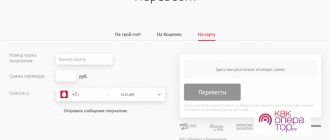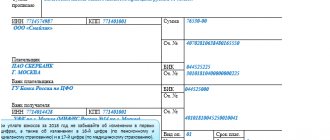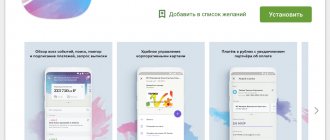Can an individual entrepreneur withdraw money from a current account for his own needs?
How much money can an entrepreneur spend on his needs? Sometimes this question leads novice entrepreneurs to a dead end. An individual entrepreneur is not a legal entity, therefore, an individual entrepreneur does not have any property that will be defined as property for professional activities.
ATM
An individual entrepreneur can use his personal belongings (for example, a car or computer) for work, and property purchased for work can be used at home. That is, in the monetary issue there is no division into personal and commercial funds.
It follows that the entrepreneur can withdraw cash from the current account of an individual entrepreneur at his own discretion.
Reference! When withdrawing money, the entrepreneur is not required to report why and how much money he is withdrawing.
To withdraw money from a current account, an entrepreneur must have a cash register. Often, such individual entrepreneurs’ transactions are quite large, and they have employees on staff. We must not forget that in order to avoid problems with the Federal Tax Service, you need to pay taxes, contributions, penalties, and so on on time.
Security rules: how to withdraw money without the bank blocking your account
Entrepreneurs, unlike legal entities, can manage money in a bank account at their own discretion (letter of the Central Bank of the Russian Federation dated 02.08.2012 No. 29-1-2/5603). But there are still restrictions: this is Federal Law No. 115-FZ dated 08/07/2001.
Banks are obliged to monitor customer transactions and not allow income to be lost. The final link in the “cash out” chains is often individual entrepreneurs, so banks check their transactions especially carefully.
We wrote in detail about blocking accounts under 115-FZ in the article. We will focus here only on the risks associated with cash withdrawal.
Don't cash out large sums
Banks are required to control transactions amounting to more than 600 thousand rubles (Article 115-FZ). But this does not mean that an amount close to 600 thousand will go unnoticed: rather, on the contrary: if you withdraw 590 thousand, the bank will definitely suspect something is wrong. Sometimes banks have questions about smaller amounts - 200-400 thousand rubles.
It is also important what percentage of the proceeds you cash out. The Central Bank of the Russian Federation considers it one of the signs of income laundering if an individual entrepreneur withdraws more than 30% of the turnover on his accounts (Methodological recommendations of the Bank of Russia dated July 21, 2017 No. 19-MR). If you withdraw that amount, be prepared to explain what you will spend it on.
Do not withdraw money immediately after receipt
Banks can block an account if an entrepreneur withdraws money several times in a row within 3-5 days from the date of receipt (Methodological recommendations of the Bank of Russia dated July 21, 2017 No. 19-MR). If you want to cash out the income from a large transaction, let the money “sit” in your account longer.
Don't withdraw all the money from your account
Entrepreneurs who do not break the law, as a rule, not only withdraw money, but also carry out non-cash payments: pay for office rent, settle accounts with suppliers. This means that they are unlikely to withdraw all the money from the account. If this happens, the bank may suspect that the individual entrepreneur is involved in the “cash out.”
Pay from your account
It is suspicious if an individual entrepreneur uses the account only to receive and withdraw money. If you have several business accounts in different banks, try to pay taxes and transfer money to contractors from each.
Keep documents confirming expenses
Even if you follow all the rules or consciously take risks to pay for a large purchase, the bank may have questions about what you withdrew the money for.
Keep all documents that can confirm how you managed the money. If these are business expenses, you will need contracts with counterparties and closing documents. If there are personal expenses, checks will come in handy. If you withdraw money from an account in one bank and deposit it into an account in another, with more favorable conditions, have a banking service agreement and a statement from the new account at hand.
The bank may require clarification, or may immediately block the account. In any case, the documents will be useful to you to prove that you are not participating in the “cash out” scheme.
We wrote about what to do if the bank has blocked an account under 115-FZ in the article “Blocking an account under 115-FZ: how to protect yourself and what to do.”
Find your bank to maintain your account
Select bank
Find your bank to maintain your account
Select bank
How to withdraw money from RS
How to withdraw money from an individual entrepreneur's current account to a Sberbank physical card. faces
In 2020, there are 4 convenient ways for individual entrepreneurs to withdraw money from their current account for personal needs:
- Cash card. This is a special plastic card that is linked to an individual entrepreneur’s account. Cash withdrawal is carried out through a bank branch.
- Cash register. The second method is quite old, which was used in the absence of the World Wide Web. To receive money from the cash register, the individual entrepreneur must fill out an application, if the amount is large, and indicate the amount of funds received. Before issuing large sums, a statement is drawn up not only for security, but also so that bank employees have time to deposit funds into the cash register. The disadvantage of this method is that it takes more time, and after receiving the cash, the individual entrepreneur must deposit these funds into the cash register and then give them to himself. All this is reflected in the book of expenses and income. In other words, accounting records are made.
- Checkbook. Everything takes up to several days, and VAT must also be paid on the amount of cash issued. An entrepreneur should find out from the manager how to cash out money from an individual entrepreneur using a checkbook.
- Card. The most preferred way to withdraw money from an individual entrepreneur. Only individuals can have cards. individuals, which means that before withdrawing funds, the individual entrepreneur must transfer them to the individual’s card. And better - on your own. When transferring to the cards of other individuals, the tax service regards the transfer as unofficial wages and 13% of personal income tax is automatically withdrawn from the transferred money.
Bank card
Note! If an individual is not a resident of the Russian Federation at the current time, then the tax rate for him will be significantly higher.
What is the difference between withdrawing money from individual entrepreneurs and legal entities?
For a legal entity, there are no legal “tax-free” ways to withdraw money. The most cost-effective option is to pay for the services of an individual entrepreneur on a simplified basis. In this case, the withdrawal will cost only 6%, however, such schemes are always under the close attention of tax authorities.
For the distribution of profits among the founders in the form of dividends, you will have to pay 13% personal income tax. And if the business owner decides to pay himself a salary, then insurance premiums will be added to the income tax at a rate of 30%.
It will also not be possible to withdraw cash from an organization’s account “just like that,” since you will have to account for each transaction according to accounting rules. Unjustified transfer from a company current account to a personal card is also impossible. Of course, from a “technical” point of view, all this can be done, but the expenses will need to be supported by documents, justifying their business purpose.
You can read more about how to legally withdraw money from an LLC in our previous article.
It is much easier for an individual entrepreneur to withdraw money from a business than for a company owner. This is due to the fact that, from the point of view of the law, an individual entrepreneur is both a businessman and an individual.
And any individual can dispose of his property without restrictions, as long as the rights of other persons are not violated. However, this does not mean that an individual entrepreneur can always get his money without problems and costs.
How much can you cash out per month?
You need to know how an individual entrepreneur can withdraw money from his account correctly. If an individual entrepreneur manages his money strangely (and this is determined by banking specialists), then the cash register may be blocked. The maximum limit that an entrepreneur can withdraw will depend on the terms of the tariff. For example, “Tochka” has some of the most favorable tariffs for entrepreneurs, allowing individual entrepreneurs to withdraw and spend up to 800,000 per month. If the tariff is simple, then the limit is on a smaller amount. How much cash an individual entrepreneur can withdraw per month without confirmation must be found out when opening a cash register.
Module Bank tariffs for individual entrepreneurs for opening a current account
To avoid problems, it is recommended to follow the following rules:
- After receiving money into your current account, do not withdraw it for at least 5 days;
- After withdrawal of funds, more than half of the funds must remain in the account;
- Cash out funds as rarely as possible and only when necessary;
- Record business expenses in your accounts just in case.
Why do banks track withdrawals? Of course, an individual entrepreneur’s money is his personal property. But the Central Bank, together with commercial secondary lending institutions, monitors the use of funds. This is necessary to identify shell companies and scammers. Therefore, the bank may sometimes request a report in the form of receipts from the amounts spent or block the account. To avoid this, before opening a cash settlement account, you need to carefully study the guidelines of each bank, which employees will follow.
Reference! As a rule, blocking occurs more often from small banks. The Central Bank exercises more careful control over them, so they strictly adhere to their guidelines and monitor their clients.
TOP 10 banks with favorable conditions for withdrawing cash from a current account
Below is a list of banks that offer favorable rates and conditions for cash withdrawals. We recommend opening a current account with them. You can consider it as an additional account, and later make it your main one.
- Tochka (bank of the Otkritie group) - up to 5 million rubles. per month without commission, after - from 2.5%.
- Tinkoff Bank - from 1%.
- Modulbank - up to 100,000 rubles. no commission depending on the tariff, and then from 2.5 to 6%, or on one of the tariffs you can give only 19 rubles. for a payment order and withdraw up to 500,000 at once.
- Promsvyazbank - from 1%.
- UBRD - from 1% and then depending on the amount of one-time withdrawal.
- Loko Bank - from 0.6% of the amount.
- Vesta Bank - from 1%.
- Alfa-Bank - from 0% depending on the amount and tariff.
- Sberbank - from 0 to 10%.
- SKB-Bank - from 1.5%.
What percentage do banks charge for withdrawals?
Tochka Bank - tariffs for individual entrepreneurs, opening a current account
On average, the percentage for cashing out in different banks is 1. As a rule, the higher the amount of money withdrawn from the account, the higher the commission percentage. And beyond a certain limit it will increase. The Central Bank has set the maximum rate at 8% and it applies mainly to withdrawals of amounts over 5,000,000.
Transferring funds to a bank
Some banks do not charge any commission for withdrawals up to a certain amount. The commission is also different for each withdrawal tool: through an individual’s card, checkbook, cash register or cash card.
Reference ! Withdrawal rules for LLCs are a little stricter than for individual entrepreneurs, but entrepreneurs still have certain difficulties. For example, if cash flow is carried out by the entrepreneur himself, and not by an accountant.
Personal account instead of current account - why?
An entrepreneur who wonders whether it is possible to make payments not through a bank account, but through a personal card of an individual, wants to provide himself with some benefits:
- no need to go through the procedure of opening a current account;
- some clients prefer to make payments from card to card;
- more economically profitable: servicing a bank card is much cheaper than a cash account.
Is such a desire legal from the point of view of tax legislation and the rules of credit organizations?
Question: Can an individual entrepreneur challenge the restrictions imposed on him on the use of the “client-bank” system and the failure to execute payment documents if his transactions are classified by the bank as dubious? Does the bank have the right to charge a commission for transferring funds from the account of an individual entrepreneur to his personal account opened for him as an individual? View the court decision
Tax office's opinion
Having analyzed the Tax Code of the Russian Federation, we can draw conclusions regarding the position of the fiscal authorities regarding the use of a personal bank card for the entrepreneurial activities of an individual:
- there is no legal requirement for individual entrepreneurs to open a current account;
- the law does not separate the personal property and funds of the individual entrepreneur and his business;
- The Tax Code does not directly prohibit the use of personal accounts in the business activities of individuals;
- it does not matter what type of account is used for crediting or transferring funds (clause 2 of article 11 of the Tax Code of the Russian Federation);
- An entrepreneur is not required to inform the tax authorities about the opening of an account, although it is recommended to do so.
CONCLUSION: it is not directly prohibited - that means it is allowed. Tax legislation does not formally object to the use of a personal card for business purposes, of course, taking into account the risks that we will consider below.
Bank's opinion
Receiving a personal bank card is also an agreement with the bank, and you should study its provisions so as not to violate them, although they are not by-laws.
If the tax office does not separate current and current accounts, then the bank does this quite clearly - Instruction of the Central Bank of the Russian Federation No. 153-I dated May 30, 2014 allows individuals to open current accounts for transactions not aimed at entrepreneurship, and for this activity an individual entrepreneur or legal entity must to open a current account (this is stipulated in clause 2 of these Instructions).
The agreement may directly state a prohibition on using a current account for business, or such a prohibition may be included in the bank regulations, which you automatically agree to when concluding an agreement.
CONCLUSION: the bank, as a credit institution, is against the use of personal cards for business purposes, since opening and servicing an account is more expensive, and therefore more profitable for the bank.
How long does it take to transfer to your own card?
Transfer from individual entrepreneur to individual card. face is usually the fastest way to transfer money. Transfers between individuals occur instantly in 80% of cases. Transfers to cards from different banks can take up to several days. Small credit institutions often transfer funds during the day and do not process transfers on weekends and holidays.
Individual entrepreneurs, as a rule, transfer funds to their own card and make purchases through it. For large credit corporations, the transfer takes no more than 5 minutes. But if the amount is large, this time may be increased, and some transfers will even require confirmation of the transfer (payment order).
To make a transfer, you must use your own cash register. As a rule, when transferring to the card of an individual entrepreneur, the tax service does not impose taxes on the transferred funds.
If an individual entrepreneur suspects that there will be a need for urgent transfers, it is better to check this information before choosing a credit institution for cash settlement services. By the way, it will be better if the current account is serviced in the bank where the individual has his own bank card.
Table: comparison of bank commissions for withdrawing cash from an individual entrepreneur’s account
1) These are numbers out of thin air, everyone’s situation is different, but in any case, why limit yourself on purpose? Now you are withdrawing 200 thousand, and six months later you have completed a large contract or recruited clients for service, and what should you do? Look for another bank, run around with paperwork and get confused again? Is it long and sad to withdraw 300 thousand at a time when it was possible to withdraw everything at once and the money would have been in the deposit/PNO for the entire period at a normal interest rate? In the Alfabank you mentioned, by putting 300 thousand on deposit as an individual entrepreneur, you exclude money from circulation for at least a month and receive 4.8%, while I will withdraw it and, at the expense of PNO in HKF, I will receive 7.5% or 6.5% in the people’s favorite Rocket. It’s not all about the money (about 700 rubles difference from Alpha per month), but considering that this is a complete freebie and you don’t have to do anything at all for this, why give it up? You can use it to buy a couple of glasses of coffee at Starbucks - isn’t that bad? 2) What are your specific conditions that there are no alternatives? I wrote above why Tinkov didn’t suit me (due to quarterly payments). 3) What questions do you discuss in person with the bank manager, if it’s not a secret? In none of the three banks where I had an individual entrepreneur account did I appear after opening the account more than once a year - to update the access key in the information security system (everywhere the validity period was a year). For all questions, you can and should write to the bank through the built-in messenger in the IB (available in any IB, because banks send official letters through it) - because All messages are endorsed with an electronic signature; this correspondence is legally significant. When I had an arrears on some tax and the Federal Tax Service blocked this amount in the account (about 50 rubles), the bank sent a notification about this through the information bank. I was in France and physically I couldn’t come to them for a long time, so I just called the bank and asked what the problem was - they replied that the Federal Tax Service blocked only these 50 rubles and they are obliged to tell me this, but otherwise the account is completely functional and no problems. Through MyDelo I requested a full tax report from the Federal Tax Service, paid all sorts of minor arrears totaling several hundred rubles (a separate question is why the Federal Tax Service likes to send all sorts of crap about fur coats, etc., but cannot, on its own initiative, inform about arrears ), after some time the Federal Tax Service saw this and removed the block from the account. Those. even in such a situation there was no need to appear anywhere in person. In our country, in general, now you can do almost anything without going anywhere - communicate with banks, and with the tax office, and with bailiffs, and partly with the courts... You still live in the paradigm “where you opened the card, go there” . No need. Now it's the 21st century. 4) In the sense of “how many payments are made”? Yes, as much as you like. Or is it important to you that some payments are given free of charge in the subscription? Well, I don't know, but at a payment price of 20-30 rubles, the maximum savings per month will be around a hundred or two. Is it worth the hassle? See above - by withdrawing money and depositing it on a physicist’s deposit, you will earn more. 5) “are there any employees (what kind of salary project), what kind of regime” - well, actually, here is an article about withdrawal, so we are talking about withdrawal. A salary project is unlikely to be very important for an individual entrepreneur, who, according to your words, withdraws an average of up to 200 thousand.
Now you are withdrawing 200 thousand, and six months later you have completed a large contract or recruited clients for service, and what should you do? Look for another bank, run around with paperwork and get confused again? Is it long and sad to withdraw 300 thousand at a time when it was possible to withdraw everything at once and the money would have been in the deposit/PNO for the entire period at a normal interest rate? In the Alfabank you mentioned, by putting 300 thousand on deposit as an individual entrepreneur, you exclude money from circulation for at least a month and receive 4.8%, while I will withdraw it and, at the expense of PNO in HKF, I will receive 7.5% or 6.5% in the people’s favorite Rocket. It’s not all about the money (about 700 rubles difference from Alpha per month), but considering that this is a complete freebie and you don’t have to do anything at all for this, why give it up? You can use it to buy a couple of glasses of coffee at Starbucks - isn’t that bad? 2) What are your specific conditions that there are no alternatives? I wrote above why Tinkov didn’t suit me (due to quarterly payments). 3) What questions do you discuss in person with the bank manager, if it’s not a secret? In none of the three banks where I had an individual entrepreneur account did I appear after opening the account more than once a year - to update the access key in the information security system (everywhere the validity period was a year). For all questions, you can and should write to the bank through the built-in messenger in the IB (available in any IB, because banks send official letters through it) - because All messages are endorsed with an electronic signature; this correspondence is legally significant. When I had an arrears on some tax and the Federal Tax Service blocked this amount in the account (about 50 rubles), the bank sent a notification about this through the information bank. I was in France and physically I couldn’t come to them for a long time, so I just called the bank and asked what the problem was - they replied that the Federal Tax Service blocked only these 50 rubles and they are obliged to tell me this, but otherwise the account is completely functional and no problems. Through MyDelo I requested a full tax report from the Federal Tax Service, paid all sorts of minor arrears totaling several hundred rubles (a separate question is why the Federal Tax Service likes to send all sorts of crap about fur coats, etc., but cannot, on its own initiative, inform about arrears ), after some time the Federal Tax Service saw this and removed the block from the account. Those. even in such a situation there was no need to appear anywhere in person. In our country, in general, now you can do almost anything without going anywhere - communicate with banks, and with the tax office, and with bailiffs, and partly with the courts... You still live in the paradigm “where you opened the card, go there” . No need. Now it's the 21st century. 4) In the sense of “how many payments are made”? Yes, as much as you like. Or is it important to you that some payments are given free of charge in the subscription? Well, I don't know, but at a payment price of 20-30 rubles, the maximum savings per month will be around a hundred or two. Is it worth the hassle? See above - by withdrawing money and depositing it on a physicist’s deposit, you will earn more. 5) “are there any employees (what kind of salary project), what kind of regime” - well, actually, here is an article about withdrawal, so we are talking about withdrawal. A salary project is unlikely to be very important for an individual entrepreneur, who, according to your words, withdraws an average of up to 200 thousand. With such a turnover, no one hires anyone as a white man, of course.
With such a turnover, no one hires anyone as a white man, of course. I don’t understand what you mean about “regime”. 6) I read the article you indicated. In my opinion, its priorities are somehow completely wrong. “The speed of opening an account” and “the need to go to the bank for this” for some reason seems very important to them, for example. But I can’t even imagine a situation in which it would be important for a person to very quickly open an account as an individual entrepreneur. Why is this even necessary? If you need to quickly get some money one time, it’s easier to do it as an individual. Entrepreneurial activity presupposes constancy and regularity, and an account is opened only once - you can wait a little and go to the bank with your feet a couple of times, but then you won’t have to strain yourself. Before registering as an individual entrepreneur, I had a situation where I needed to get money from an organization with strict reporting and audit. We thought with their accounting department and carried out the development of software for them as a sale by me of this software in the form of a boxed solution, which I myself had previously developed. As a result, they did not pay social taxes, and I only paid 13% personal income tax. The subsequent desk tax audit had no claims against me. But this was an emergency situation; in the real world, people would simply transfer money from card to card. And you can open an individual entrepreneur account calmly and without haste.
I don’t understand what you mean about “regime”. 6) I read the article you indicated. In my opinion, its priorities are somehow completely wrong. “The speed of opening an account” and “the need to go to the bank for this” for some reason seems very important to them, for example. But I can’t even imagine a situation in which it would be important for a person to very quickly open an account as an individual entrepreneur. Why is this even necessary? If you need to quickly get some money one time, it’s easier to do it as an individual. Entrepreneurial activity presupposes constancy and regularity, and an account is opened only once - you can wait a little and go to the bank with your feet a couple of times, but then you won’t have to strain yourself. Before registering as an individual entrepreneur, I had a situation where I needed to get money from an organization with strict reporting and audit. We thought with their accounting department and carried out the development of software for them as a sale by me of this software in the form of a boxed solution, which I myself had previously developed. As a result, they did not pay social taxes, and I only paid 13% personal income tax. The subsequent desk tax audit had no claims against me. But this was an emergency situation; in the real world, people would simply transfer money from card to card. And you can open an individual entrepreneur account calmly and without haste.
How much should I keep in my current account?
Inexperienced entrepreneurs regard a current account as a means or tool for immediate payment of taxes and contributions, but control over accounts is much stricter.
Individual entrepreneur
In practice, this is far from the case: an entrepreneur’s cash settlements should have as much money earned legally as possible. If there is a constant lack of funds in the account, the tax office may become interested in the entrepreneur. There will be increased control over the intended use of funds, as well as over the legality of the activities carried out by the person.
The funds left in the account must be in reserve to instantly pay open payments, fines and fees. Especially when the entrepreneur does not have his own permanent accountant, who can be entrusted with the responsibility of maintaining and submitting reports. A professional will be able to correctly reflect transactions in the accounting book, as well as correctly calculate and submit tax documentation on time.
By the way, some individual entrepreneurs do not have their own cash register service at all. These are entrepreneurs who have no employees, and the amount of each transaction does not exceed 100,000 rubles. They use a regular cash register, their own card and are responsible for storing their funds themselves. But this does not exempt you from paying taxes.
Reference ! From an economic point of view, it is more profitable to make tax contributions and payments from a current account rather than by transferring to a card or withdrawing cash. There are no questions about such expenses from any authorities, and the entrepreneur himself can conduct financial transactions and know when and what was paid.
What do individual entrepreneurs want and what do they risk?
Entrepreneurs are interested in the opportunity to perform the following types of operations:
- payment to a personal bank card by clients;
- withdrawing money from your current account to your bank card;
- transferring money from your account to bank cards of third parties.
Let's take a closer look at the possibilities and risks of each of them.
Crediting other people's funds to an individual entrepreneur's personal card
Is it possible to receive payments from clients into your current account, especially regularly? In other words, this will be the use of a personal card for business purposes. Based on the positions of the tax office and the bank, the answers will be different: the tax office does not directly object, the bank prohibits it, but cannot always control it.
Possible risks from the tax authorities
The inspectorate may consider all receipts on the card taxable, and not just those made “for business”. As a result, tax authorities have the right to assess additional tax, issue a fine for arrears and a penalty for late payment. The individual entrepreneur will have to prove which part of the income is income and which is not, and document this. If this cannot be proven, they may be charged with “systematic tax evasion,” which is fraught with serious sanctions.
Possible risks from the bank
If an entrepreneur violates the terms of use of a bank service, and transferring business money through a personal card is a violation, the bank has the right to stop providing the service, that is, to block the card, not only this one, but also others belonging to this person. In addition, as part of the fight against money laundering, regulated by Federal Law No. 115, banks are required to report suspicious movements of funds to the tax and law enforcement agencies. Regular receipts on an individual’s card, especially in large amounts, may well be considered such. The individual entrepreneur will have to resolve the issue not only with the bank - explain and confirm the sources of funds.
Withdrawing your funds from your current account to your card
From the point of view of the law, an individual entrepreneur keeps his own funds in both a current and personal account. He has the right to dispose of them at his own discretion. Income from business activities can be used by an entrepreneur as he pleases, without restrictions, including withdrawn to a personal card for any needs. The purpose of the transfer should indicate “Income from business activities, excluding VAT” or simply “Financial assistance” (to avoid a possible conflict with the bank).
Possible risks
As stated above, banks do not encourage the “mixing” of personal and business funds. It is not uncommon for them to send such clients a warning and recommendation. However, this is precisely a recommendation, and not a ban, to which they do not have a legislative right. In response to such a requirement, one can point out its illegality and fallacy, because the property of an individual entrepreneur and an individual is one and the same. If there is no response from the bank, you can appeal its actions to the Central Bank of the Russian Federation, as well as to the Antimonopoly Committee.
If large amounts of money are regularly passed through this operation, you will have to explain their origin and purpose to the tax office in order to avoid charges of tax evasion.
FOR YOUR INFORMATION! You can replenish your own account from your card without risks and restrictions.
RESULT: this operation is allowed, but it should not be abused. If it is proven that you use the transferred funds for business, you will have to pay tax on them. For personal purposes – translate to health.
When is money transferred to an individual entrepreneur’s account?
Most often, money is transferred to the bank account of an individual entrepreneur as payment. This can be payment for goods purchased or services provided by the entrepreneur.
Also, the transfer of funds is necessary for settlements not only with clients, but also with suppliers.
Although having a current account is not mandatory in our country, it makes financial transactions much easier.
As an advantage, it can be noted that you can transfer money to current accounts without thinking about restrictions: there are no restrictions on the amount.
If we talk about an individual’s account, then a limit is usually set for the movement of funds through it.
Withdrawal methods
Cashing out can be done in the following ways:
- Receiving money at the cash desk. institutions on the basis of a payment document - a procedure similar to withdrawing cash to pay salaries to employees or to settle accounts with counterparties. Money is provided on the basis of an expenditure order.
- Transfer to an individual entrepreneur’s personal account and a linked payment card - after completing the transaction, the funds can be cashed out at any ATM.
- Transfer to a deposit or savings account - with this option, you can cash out at the time of closing the deposit agreement.
There is another way - transferring money to a checkbook. But at present this option is used extremely rarely.
Recommended wording
The following recommended wording should be used:
- Top up your card account for personal needs.
- Translation for personal use.
- Funds to cover personal needs.
The wording does not necessarily have to be exactly like this. The purpose of the payment must be formulated in such a way that it is clear that the funds are transferred for personal use and are not income.
Before transferring money to an individual entrepreneur's current account, you should consider the following. In cases where it is necessary to deposit money into a current account in order to make mutual settlements with a counterparty, it is necessary to note in the assignment that this is a replenishment. Otherwise, the specified transfer will be perceived by the tax office as income. Accordingly, tax will be charged on it in accordance with legal provisions.
If accounts are opened in different banks, is it possible for an individual entrepreneur to transfer money between his accounts? As practice shows, this is quite possible. An important note is that such transactions are not subject to taxes.
How to deposit funds into an individual entrepreneur's account
The most well-known method is to go to the office of a banking organization and deposit cash into your account through the cash desk.
But it is not always possible to visit the bank, and you need to transfer money to your account. In this case, you need to decide: you want to deposit your personal funds or proceeds from your activities into the current account.
In the first situation, there are more options for replenishing your account:
- Cash at the bank office;
- Through electronic money transfers;
- Through an ATM;
- From your card.
In addition, if you want to make a transfer, the receipt of funds must be justified. That is, explain the origin of money.
However, remember that in the purpose of the payment you should indicate “depositing personal funds into the account” or something similar to reflect the essence of the transaction.
Please note that if you deposit personal money into your current account, this amount does not need to be entered in the Book of Income and Expenses, since this money is not your income, and therefore will not be taken into account for calculating the tax base. They can be considered as a kind of interest-free loan.
Illegal withdrawal methods
Not all entrepreneurs are ready to comply with the laws, especially when large sums are involved. Large cash withdrawals may result in the account being blocked until the circumstances surrounding the receipt of funds are clarified. Some banks even break off relations with such clients.
Sometimes entrepreneurs withdraw money through shell companies. The latter are registered in the name of the person who was misled. Registration of such a company using a stolen passport is also possible. Large sums are transferred to the account of such a company by the individual entrepreneur, and are withdrawn by him. The created shell company must pay tax, which it naturally does not do.
Most often, entrepreneurs resort to illegal methods of withdrawing money in order to avoid paying taxes. However, as a result of fraud detected by government agencies, you will have to pay much more. You probably yourself know the consequences of withdrawing funds by circumventing the law: it could be a fine, or there could be criminal liability.
To avoid unpleasant consequences, we recommend using proven and legal methods of withdrawing money from an individual entrepreneur’s bank account. There is nothing complicated about this, the main thing is to choose the most convenient option for yourself.








